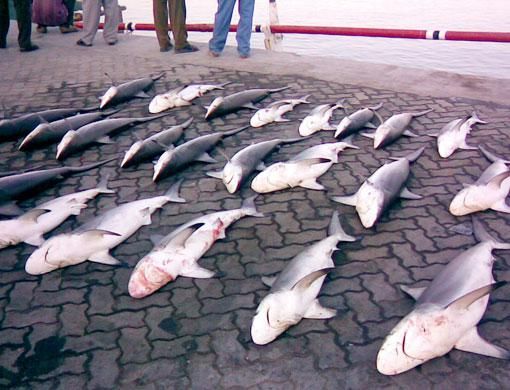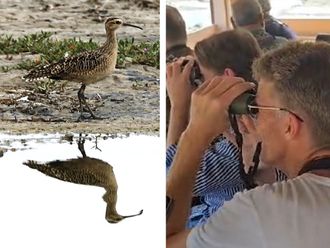Dubai: A shark catch monitoring study is needed in the UAE, say environmentalists who hope to get the project under way soon as the shark population continues to crash, unaided by myths surrounding the false benefits of shark fin.
The Emirates Wildlife Society-WWF is currently working on a proposal for a proper assessment of shark catch, import and export from the UAE as well as conducting a study on the different species of shark present in the UAE.
Sharks are suffering a rapid decline due to a false notion that their fins, commonly prepared as a soup, can induce good health and sexual prowess.
It is also seen as a sign of wealth and prestige in Asian culture, with tonnes of sharks finned for this market. Illegal fishing can seem quite lucrative to poor fishermen when a pound of shark fin can sell for $200 (Dh735.60).
Shark finning is deemed particularly brutal by environmentalists, as in some cases, sharks are thrown back into the sea, finless - as the meat is worth less than the fins - and they are made to suffocate to death, unable to swim or move.
Major exporters
According to the Food and Agriculture Organisation (FAO), the UAE is one of the main Middle East exporters of shark fins to Hong Kong, exporting around 400-500 tonnes per year between 1998 and 2000.
The latest figures from 2003 show that shark catch went up to 3,060 tonnes a year in the UAE.
"The UAE is an import-export hub, though it is not clear whether the number of shark fins exported originate entirely from the UAE or are just passing through the country," said Dr Christophe Tourenq, science and research manager for EWS-WWF.
Shark catch in Yemen is also particularly high at 7,250 tonnes a year.
"The UAE and Oman have banned the process of bringing only shark fins back to shore. The whole fish should be landed. This is to minimise the number of sharks finned at sea and thrown back. Outside territorial waters, though, it's impossible to monitor what goes on," said Tourenq.
Shark products are not banned, so shark fin soup will most likely feature on restaurant menus for many years, but at what cost?
"It is clear today that catching sharks has gone beyond anything close to being sustainable. If some communities use them for their own needs fine, but the market demands have become so commercial that it is a real burden on shark populations," said Dr Tourenq.
Sharks are unusually sensitive to fishing because their populations grow so slowly, a consequence of reaching sexual maturity late and producing few young ones.
More than half of the world's pelagic sharks and rays are under threat of extinction because of habitat destruction, overfishing of their preys or themselves, according to the International Union for Conservation of Nature (IUCN).
According to Tourenq, there is a need for clarity and updated information. In the UAE, there should be about 46 species of sharks and rays, but a lot of these species' biology and behaviour are unknown, he said.
Protective legislations for overfishing are minimal. The Convention on International Trade of Endangered Species (CITES), of which the UAE is a signatory, applies only to whale-sharks.
The Convention on Migratory Species (CMS) has also been concerned only with whale sharks so far. Dr Tourenq says the UAE is in discussion to integrate the CMS.
In the UAE, Article 29 of Federal Law 23 states: "The Minister shall determine the banned species of fish and marine creatures for catching, extracting their eggs, skin or fins or for any other purposes."
Fin Soup
Shark Fin Soup sources: Major players in import, export and trade of sharks by Traffic Oceania
- Top 5 importers (%)
Spain 15.1
Korea 14.5
China, Hong Kong SAR 11.6
Mexico 10.1
Italy 8.8 - Top 5 catch production (%)
Indonesia 14.2
Taiwan 7.8
India 7.4
Spain 7.2
USA 4.1 - Top 5 exporters (%)
Taiwan 20.5
Spain 13.4
Costa Rica 6.7
Chile 6.3
UK 5.4













